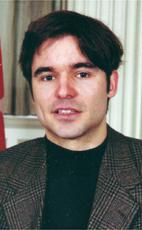Madam Speaker, I would like to start my maiden speech in the House by thanking my riding for trusting me since, as you can see, I am the youngest member in the House of Commons. It was not certain, when I first stood as a candidate, that my youth would be an asset. As a mater of fact, I would also like to congratulate the Bloc Quebecois for being an open and forward looking party which is ready to forge ahead with young people and the whole gamut of society. I am very proud of our party.
I am very happy and greatly honoured to represent the riding of Lac-Saint-Jean. A Tremblay representing Lac-Saint-Jean, a riding which does not shy away from innovation, a riding which could be called the heartland of Quebec. My colleagues here are very close to me, but the riding of Lac-Saint-Jean was the first one to say yes to sovereignty along with the area of Saguenay-Lac-Saint-Jean-I am talking about the 1980 referendum, of course-and which showed the way to the rest of Quebec, as we saw during the last referendum. It is practically the birth place of the Bloc Quebecois thanks to my predecessor, Mr. Lucien Bouchard, who is now the Premier of Quebec.
When I say that it is Quebec heartland, I do not mean only in political terms. Michel Gauthier comes from Roberval, the riding next to mine, which is also part of the Saguenay-Lac-Saint-Jean area; this is truly the heartland of Quebec. People in my riding are warm, welcoming, fun-loving people who are easy to get along with.
Unfortunately, it is a riding faced with some problems, and this is one of the reasons why I decided to enter politics. Like many other remote areas in Quebec, in the rest of Canada, and even throughout the world, it is plagued by a serious problem: young and not so young people are leaving in search of a job.
Another reason is the fact that my riding is the victim of the transition from the industrial era to the era of the small and medium size businesses. We will probably need, and I hope so, the help of the federal government to support businesses.
This is also a riding that, I think, is full of potential, full of natural resources and full of people with great potential. Last September, this riding, this region of Quebec showed it can innovate by developing a regional strategic planning. When they noticed things were going badly, they got all the stakeholders together to establish a guideline. The main element that came out was decentralization.
Which brings me to the bill before us, a bill that goes against what our region and Quebec as a whole, what all Quebecers want, namely decentralization. Ultimately, we want to take matters in our own hands. We want to manage our own business. And the more things will be close to the people, the better it will be.
At the last referendum we lost-we lost it, these are very big words-

